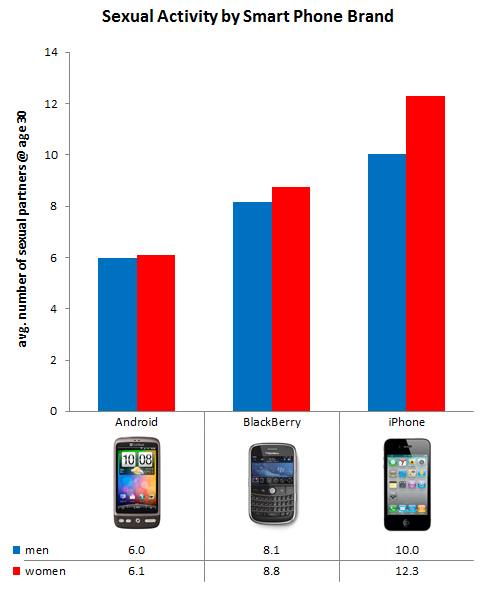Sex and Smart Phones
Popular online dating site OkCupid recently released some numbers users reported regarding their sex lives. One interesting correlation was between smart phone usage and number of sexual partners. As you see below, women iPhone users (at the age of 30) report having had 12.3 sexual partners, over twice as many as women Android users. Male smart phone users show a similar jump: from 6.0 sexual partners on Android to 10 on the iPhone. Blackberry users fall almost exactly in the middle.
The conclusion seems very simple: Look for a cute iPhone owner to get lucky with.
But, being careful about interpreting correlational data (and an avid iPhone user, I might add), I’ll offer a bit of advice: Please consider an alternative explanation of this graph: that iPhone owners might simply be more prone to exaggerate…..
Dear Irrational (Does it Pay to Play Hard to Get?)
Dear Irrational,
I recently met a great guy – let’s call him George – and now I can’t stop thinking about him. Though we’ve only been on a couple dinner dates, he’s officially won me over.
Now here’s my problem: Smitten as I am, I’m ready to hop into bed with George this very minute, but I’m not sure that’s the best idea. After all, there must be some reason that all those books and magazines (not to mention my mother) champion the make-him-wait rule. But does it really work? I’ve never followed it in the past, but then, I can’t say I have the best dating track record either.
What do you think? Should I play hard to get, or no? Help!
Sincerely,
Unsure
——
Dear Unsure,
Your mother is right: making the guy sweat a little (no, not like that) is in your best interest if you want to maximize the chances f a long term relationship. The reason lies in cognitive dissonance, which refers to what we do when our beliefs and actions misalign: Can’t change the cold, hard facts? Then change your beliefs!
The classic experiment here comes from psychologists Leon Festinger and James Carlsmith, who had participants perform a boring task and then paid them either $20 or $1 to convince someone else that the task had been great fun. Everyone then rated the task, with the result that the $1 participants rated the task more positively than did the $20 crew. While the $20 group could explain away the dissonance between their action (“I told someone the task was riveting”) and their belief (“It actually bored me to tears”) via money (“I was paid to promote the task”), the $1 individuals could not because they could not justify misleading others for such a small amount of money– so they changed their initial belief (“I must really like the task, to have promoted it”) and they ended up rating the task more positively.
To give you an example that is closer to our social life, look at fraternities: loyalty to frats increases with the amount of hazing, since pledges tell themselves, “I did a lot of embarrassing stuff for my frat – it must really matter to me.”
So, going back to your dilemma, Unsure, cognitive dissonance suggests that if you really want a guy, you have to create a dissonance for him, so that he will say, “Wow, if I put in all this effort for the woman – I must love her.”
This means that instead of putting out early, you have George pursue you. Instead of splitting the check, you let him pick up the entire tab. Instead of calling him up and suggesting dates, you leave the calling and planning up to him. In other words, make him work, and he will rationalize it by deciding he loves you.
Good luck.
Irrationally yours,
Dan
p.s please don’t tell George about my advice, and who gave it to you
SHHH . . . DON’T SAY ‘RECESSION.’
I wrote this about 8 months ago — but it makes particular sense right now ….
—
If (as is often the case) talking about sex makes people more interested in having it, does that mean that the current talk about a recession could actually be creating one? Well, maybe.
Or so one general finding of behavioral economics would have us believe. With all this chatter about a recession, consumers might, for example, hold off on buying that new dishwasher because of the “bad economy,” or pass up the more expensive restaurant because “we’re in a recession.” Without any discussion about recession, we’re unlikely to change our pattern of behavior. But talking about it can be a force that affects our decisions and alters our consumption habits.What makes me think that we’re such creatures of habit? Consider the experience of eating a Godiva truffle: The chocolate is melting in your mouth, the aroma penetrates your nose, there is a small nut inside. . . . Now think about this familiar experience and try to determine how much it’s worth to you. A quarter? $0.50? $0.75? $1.25? $2.50? While the experience of eating a truffle is very familiar, figuring out what we would be willing to pay for it proves difficult. So what do we do when we make purchasing decisions? (more…)

 Tweet
Tweet  Like
Like